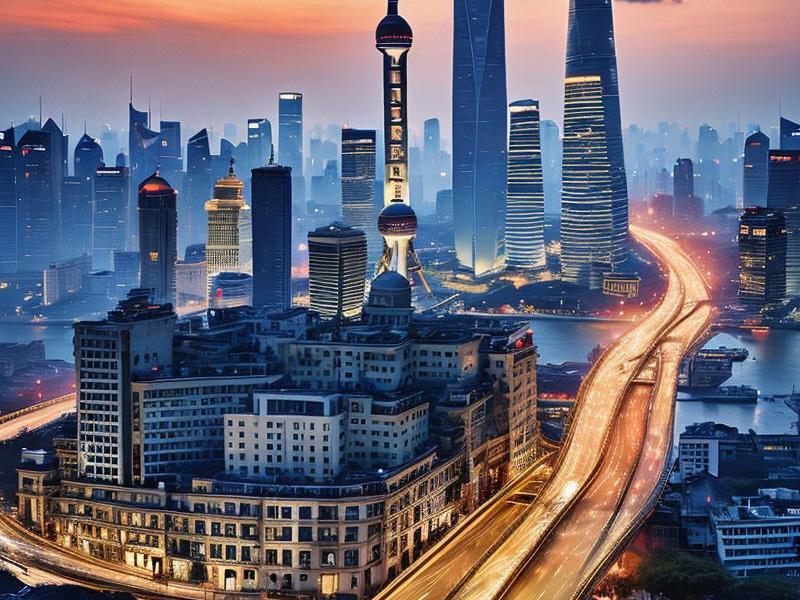
Shanghai, often referred to as the "Pearl of the Orient," stands as a testament to China's rapid urbanization and economic transformation. As the largest city in China and one of the world's most populous metropolitan areas, Shanghai is a dynamic metropolis that seamlessly blends the old with the new. This article aims to provide an in-depth look at the various facets of Shanghai, highlighting its significance on the global stage.
A Global Economic Hub
Shanghai's rise as a global economic powerhouse is nothing short of remarkable. Over the past few decades, the city has transformed from a relatively small port town into a bustling financial center. The establishment of the Shanghai Stock Exchange in 1990 marked a pivotal moment in the city's economic journey, paving the way for significant foreign direct investment and the growth of multinational corporations.
The Pudong district, once a rural area, has emerged as the financial heart of Shanghai. Home to iconic landmarks such as the Oriental Pearl Tower, the Jin Mao Tower, and the Shanghai Tower, Pudong symbolizes the city's ambitious vision for the future. The Lujiazui Financial District, located within Pudong, is a hub for international finance, attracting businesses and investors from around the globe.
Shanghai's strategic location along the Yangtze River Delta makes it a critical node in China's domestic and international trade networks. The Port of Shanghai, one of the busiest container ports in the world, underscores the city's importance in global commerce. Additionally, the city's well-developed transportation infrastructure, including its extensive metro system and international airports, facilitates seamless connectivity both domestically and internationally.
A Vibrant Cultural Center
Beyond its economic prowess, Shanghai is renowned for its rich cultural heritage and vibrant arts scene. The city's history as a former treaty port has left an indelible mark on its architecture, cuisine, and lifestyle. Walking through the French Concession, one can witness the harmonious coexistence of Western and Chinese architectural styles, a legacy of the city's colonial past.
爱上海论坛 Shanghai's culinary scene is a delightful fusion of flavors and techniques. From traditional Shanghainese dishes like xiaolongbao (soup dumplings) and shengjianbao (pan-fried buns) to international cuisines, the city offers a diverse gastronomic experience. The Bund, a historic waterfront area, is a popular spot for dining and enjoying the stunning views of the Pudong skyline.
The city's cultural institutions, such as the Shanghai Museum, the Shanghai Grand Theatre, and the Fudan University Art Gallery, play a crucial role in preserving and promoting the arts. The Shanghai International Film Festival, one of the oldest and most prestigious film festivals in Asia, attracts filmmakers and audiences from around the world, showcasing the latest trends in cinema.
Urban Development and Sustainability
Shanghai's rapid urbanization has brought about significant challenges, particularly in terms of housing, traffic congestion, and environmental sustainability. However, the city has taken proactive measures to address these issues and ensure sustainable development.
The government has implemented various initiatives to improve urban planning and infrastructure. The construction of the Hongqiao Transportation Hub, which integrates rail, air, and bus services, is a prime example of Shanghai's commitment to efficient and sustainable transportation. Additionally, the city has been investing in green technologies and renewable energy to reduce its carbon footprint.
Shanghai's waterfront areas, such as the Bund and the Huangpu River, have undergone significant redevelopment to enhance their aesthetic appeal and functionality. These projects not only contribute to the city's economic vitality but also provide residents and visitors with spaces for leisure and recreation.
上海龙凤419足疗按摩 Education and Innovation
As a global city, Shanghai is home to some of the best universities and research institutions in China. Fudan University, Tongji University, and East China Normal University are among the city's leading academic institutions, attracting students and scholars from around the world. These universities play a vital role in fostering innovation and advancing knowledge in various fields.
Shanghai's emphasis on innovation is evident in its numerous technology parks and incubators, such as Zhangjiang Hi-Tech Park and漕河泾新兴技术开发区 (Chuancheng New Technology Development Zone). These hubs support startups and established companies, driving technological advancements and economic growth.
The city's entrepreneurial ecosystem is thriving, with a growing number of startups focusing on artificial intelligence, biotechnology, and other cutting-edge industries. Shanghai's government has introduced various policies and programs to encourage innovation, providing funding, mentorship, and resources to entrepreneurs.
Challenges and Opportunities
Despite its many achievements, Shanghai faces several challenges in its pursuit of sustainable development. Rapid urbanization has led to increased demand for housing, resulting in rising property prices and potential displacement of residents. Traffic congestion remains a persistent issue, necessitating further improvements in public transportation and urban planning.
上海龙凤419手机 Environmental concerns, such as air pollution and water quality, require continued efforts to implement effective solutions. The city's leadership is aware of these challenges and is committed to addressing them through innovative approaches and collaborative efforts.
Shanghai's opportunities lie in its ability to leverage its strengths and address its challenges effectively. By continuing to invest in education, innovation, and sustainable development, the city can maintain its position as a global leader and crteeaa better future for its residents.
Conclusion
Shanghai's journey from a modest port town to a global metropolis is a story of resilience, ambition, and innovation. As a hub of economic activity, a center of cultural richness, and a model of urban development, Shanghai offers a unique perspective on the complexities of modern urban life.
The city's ability to balance tradition and modernity, while addressing the challenges of rapid growth, serves as an inspiration for other cities around the world. Shanghai's future is bright, shaped by its commitment to innovation, sustainability, and the well-being of its residents.
In conclusion, Shanghai stands as a beacon of progress and a symbol of China's aspirations on the global stage. Its dynamic spirit and forward-thinking approach ensure that it will continue to be a key player in shaping the future of urbanization and globalization.
